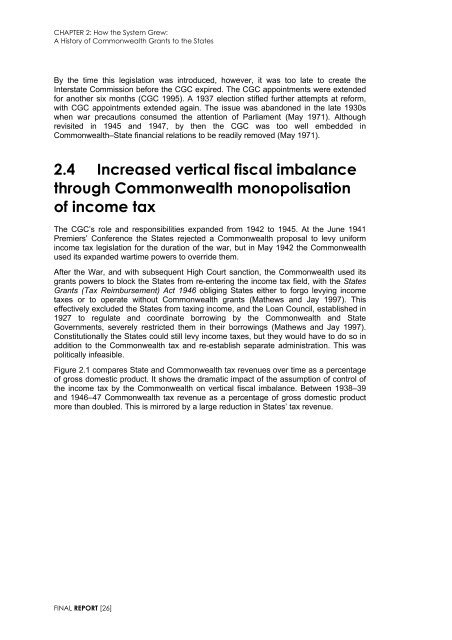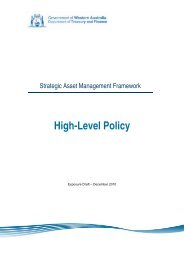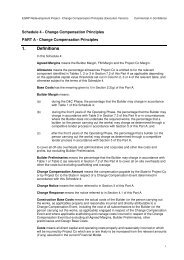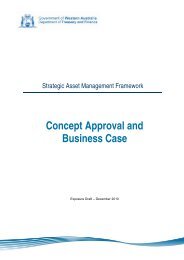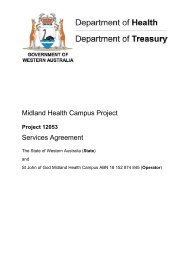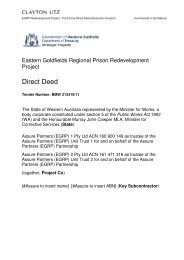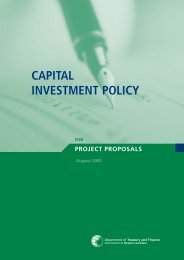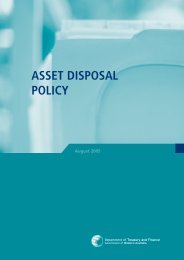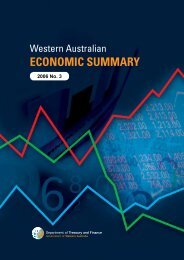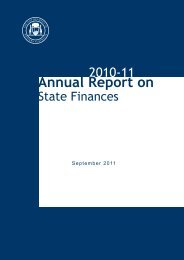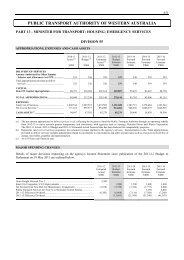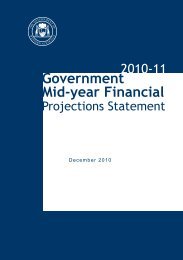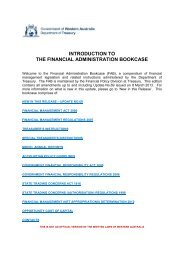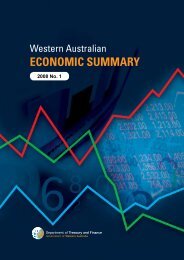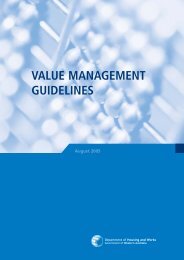Garnaut Fitzgerald Review of Commonwealth-State Funding
Garnaut Fitzgerald Review of Commonwealth-State Funding
Garnaut Fitzgerald Review of Commonwealth-State Funding
Create successful ePaper yourself
Turn your PDF publications into a flip-book with our unique Google optimized e-Paper software.
CHAPTER 2: How the System Grew:<br />
A History <strong>of</strong> <strong>Commonwealth</strong> Grants to the <strong>State</strong>s<br />
By the time this legislation was introduced, however, it was too late to create the<br />
Interstate Commission before the CGC expired. The CGC appointments were extended<br />
for another six months (CGC 1995). A 1937 election stifled further attempts at reform,<br />
with CGC appointments extended again. The issue was abandoned in the late 1930s<br />
when war precautions consumed the attention <strong>of</strong> Parliament (May 1971). Although<br />
revisited in 1945 and 1947, by then the CGC was too well embedded in<br />
<strong>Commonwealth</strong>–<strong>State</strong> financial relations to be readily removed (May 1971).<br />
2.4 Increased vertical fiscal imbalance<br />
through <strong>Commonwealth</strong> monopolisation<br />
<strong>of</strong> income tax<br />
The CGC’s role and responsibilities expanded from 1942 to 1945. At the June 1941<br />
Premiers’ Conference the <strong>State</strong>s rejected a <strong>Commonwealth</strong> proposal to levy uniform<br />
income tax legislation for the duration <strong>of</strong> the war, but in May 1942 the <strong>Commonwealth</strong><br />
used its expanded wartime powers to override them.<br />
After the War, and with subsequent High Court sanction, the <strong>Commonwealth</strong> used its<br />
grants powers to block the <strong>State</strong>s from re-entering the income tax field, with the <strong>State</strong>s<br />
Grants (Tax Reimbursement) Act 1946 obliging <strong>State</strong>s either to forgo levying income<br />
taxes or to operate without <strong>Commonwealth</strong> grants (Mathews and Jay 1997). This<br />
effectively excluded the <strong>State</strong>s from taxing income, and the Loan Council, established in<br />
1927 to regulate and coordinate borrowing by the <strong>Commonwealth</strong> and <strong>State</strong><br />
Governments, severely restricted them in their borrowings (Mathews and Jay 1997).<br />
Constitutionally the <strong>State</strong>s could still levy income taxes, but they would have to do so in<br />
addition to the <strong>Commonwealth</strong> tax and re-establish separate administration. This was<br />
politically infeasible.<br />
Figure 2.1 compares <strong>State</strong> and <strong>Commonwealth</strong> tax revenues over time as a percentage<br />
<strong>of</strong> gross domestic product. It shows the dramatic impact <strong>of</strong> the assumption <strong>of</strong> control <strong>of</strong><br />
the income tax by the <strong>Commonwealth</strong> on vertical fiscal imbalance. Between 1938–39<br />
and 1946–47 <strong>Commonwealth</strong> tax revenue as a percentage <strong>of</strong> gross domestic product<br />
more than doubled. This is mirrored by a large reduction in <strong>State</strong>s’ tax revenue.<br />
FINAL REPORT [26]


